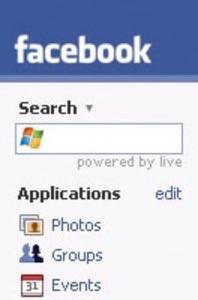Microsoft Live Search on Facebook is “a no-brainer […] the technical investment is minuscule and the potential return is mammoth.” That was ReadWriteWeb last October in the wake of a $240 million investment by Microsoft in the world’s second biggest social network. At the time, we noted that Facebook was already serving over 600 million searches per month. If Microsoft could convert half of those to web searches, it would take a significant chunk of the search market (where Live does just under a billion searches and Google does just over 4 billion each month). So why hasn’t it happened yet?

Early this morning, Robert Scoble wrote a long rambling post laying out a world domination plan for Microsoft that goes something like this: Microsoft buys Yahoo!, Yahoo! Search is popped into Facebook, and Google is locked out of a significant portion of the web. Scoble calls this Microsoft’s “buy enough and keep it closed” search strategy.
There are, of course, a few problems with this idea. First, as Nick O’Neill points out, the wall-garden approach to the web that AOL tried in the 90s didn’t work then, so why would it work now? Second, as Erick Schonfeld notes, Microsoft has their own search engine already — Microsoft doesn’t need to buy Yahoo! to crawl or put a search engine on Facebook.
Scoble shares an experiment he did recently with Loic Le Meur, of Seemic. Le Meur put an identical event listing on both Facebook and Upcoming.org — meaning one was available only on Facebook, and the other to the web at large (including Google). After a couple of weeks, the Facebook listing had almost 5 times as many RSVPs as the public event listing on Upcoming.org. To Scoble, this seems to indicate that Facebook is the new web. “This is a fight for the Web. We all just crawled inside a box that locks Google out,” he writes.

That’s hyperbole — not unusual for Scoble. Google hasn’t crumbled because it can’t search Facebook, and it won’t if Microsoft gets that opportunity. What the event listing experiment shows is that there are some things that Facebook is very effective at — namely spreading information quickly and virally. Scoble infers that because Facebook is so good at spreading information socially, people will be increasingly drawn to it at the expense of any search engine that can’t crawl that information. That may be half true, though it would seem that the kind of information that Facebook is good spreading — the transient, prescient, ever-changing kind like event listings — is probably not the type that search engines are best at finding. (Also, let’s not forget that Google has a search deal with MySpace — which is still the most popular social network.)
There are two ways people find information on the Internet: via search (which Google is great at), and via their friends (which Facebook is great at). The former we also know how to monetize. If Facebook can get good at search, it could stand to make a lot of money for whoever it partners with for that — the logical choice being Microsoft. But to do that, Facebook needs to do something it is loathe to: let users wander off the site.
It’s not so much that Microsoft needs Facebook to let it crawl the social network, it’s more that Microsoft needs to convince Facebook to let it try to turn its members into searchers.
















